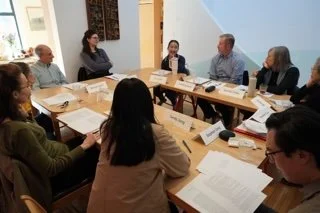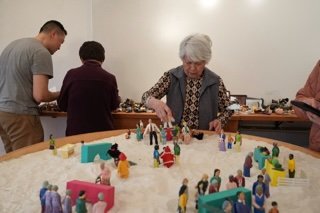Wildflowers Institute Discovery News
Advancing From the Inside Out
February 5, 2026
This year, we will continue to advance our “inside-out” strategy for community sustainability with the goal of designing and disseminating an approach to Flow Funding empowerment. This approach inverts traditional philanthropy by starting from the inside and working out—discerning and illuminating a community’s own priorities and assets, and unleashing the latent reserves of moral energy in self-organizing groups.
This work is uncommon and draws upon our long experience and the study of other innovators in community empowerment. Our study of Marion Weber’s Flow Funds (1992–2022) reveals her ability to identify and discern change-makers who are motivated first and foremost by their highest purpose in life and are guided by their moral compass. Among Marion’s Flow Funders are Roshi Joan Halifax, founder and abbot of Upaya Zen Center; Professor Angeles Arrien, anthropologist and author of The Four-Fold Way; and Dr. Rachel Naomi Remen, professor at the Osher Center of Integrative Medicine, University of California, San Francisco. They and many other caring innovators have a refined sensibility and understanding of what it takes to advance quality of life, what projects advance and sustain community, and how best to support local endeavors.
For over 30 years, the Institute has been helping informal leaders build their communities. Hanmin Liu (standing in the back of the room) engaged with a group of resident elders in Shanghai (December 26, 2004).
Wildflowers Institute is applying Marion’s discernment to support the well-being of the diaspora in San Francisco’s Chinatown and Tenderloin, and in the Lao Iu Mien community in Northern California. For more than thirty years, the institute had been helping informal leaders build their communities. Our research highlights the importance of extended families and clans in the organization of healthy communities. Most important, a community’s elders offer guidance and protection and foster collective problem-solving, drawing from their history, culture, and past experiences. Stability and safety emerge from this form of informal leadership. The elders’ self-organized activities create the social and cultural fabric that in turn become the foundation for the more formal, institutional efforts at the neighborhood level. Although the elders’ focus is on strengthening relationships, nonprofit leaders in a neighborhood build upon more traditional public and private means to provide affordable housing, education, health safety, and medical care, as well as other supportive and financial services.
Our challenge is to identify and cultivate an interface between two distinctly different units of social transformation—the informal genius of self-organized communities and the formal structures of traditional services. Our experience in sustaining change tells us that the cross-pollination of talent and local resources from both the community and the neighborhood would further improve community-based solutions. This cross-pollination, we think, is best supported by Flow Funding.
Seminar participants
engage in an
Aspen dialogue.
These insights into cross-pollination have been percolating, but they emerged with greater clarity during a recent Wildflowers seminar entitled “Narrative, the Gift, and Belonging,” held at the institute on January 17–18, 2026. Together with the Aspen Institute, we convened a cross-sector group of thinker-practitioners to explore ways in which new narratives and conceptions of exchange might help illuminate and strengthen a community’s sense of belonging. This small cross-sector group of local leaders with whom we’ve been working reflected on their personal and professional experiences, challenging us all to be more imaginative in how we approach community development. Alongside this group, we convened a group of elders who identify themselves as Radiant Lights of the Setting Sun, to reflect on and illustrate their experiences of individual and community transformation.
When we placed the insights of these conversations side by side, we saw even more clearly the strengths and weaknesses of the formal and informal approaches, as well as the weaknesses that derive from a lack of cross-pollination. The formal approaches tended to emphasize existing legal and institutional regulations focused on accountability and transparency. The informal approaches reflected a desire for social harmony and cooperation. Through our discussions it became clear that while both approaches might aim for community empowerment, they represented quite different conceptual frameworks, strategies for change, financial models, visions of community, and senses of scale. What if the conventional and formal institutional approach fails to recognize and unleash the strengths of the informal community? What if the institutional approach has the potential to diminish rather than build upon the strengths of the informal community?
An elder contributes to the Radiant Lights group model.
The seminar integrated the Aspen Institute’s method of moderated, text-based dialogue with Wildflowers’ patented approach to symbolic illustration through model building. This integration of methodologies proved to be a powerful way of bringing to the fore the analytical, emotional, and imaginative dimensions of thinking about and experiencing community. For the thinker-practitioners, the discussions and model building helped reveal the moral North Star that illuminates their journey of self-transformation. Stories by Chinese elders, the Radiant Lights, showed the importance of developing personal character and virtues to guide them and their extended families in solving problems and in their community transformations. These narratives lay the foundation for a collective body of humanistic wisdom from which elders and their self-organized enclaves identify the talents and resources invisible to others in their living quarters.
The seminar discussions have created a kind of nursery of ideas, an ongoing dialogue that is unearthing and clarifying a body of moral guidance in service to residents in the neighborhood. The narratives, expressions of goodwill in motion, and shared identity of seminar participants are forming a collective strategy of how best to align among diverse groups. Together, we’re gaining even more insight into how best to utilize the power of Flow Funding—in theory and in practice.
Wildflowers Institute holds in high esteem our partnerships with the Tenderloin Neighborhood Development Corporation (TNDC), Chinatown Community Development Center (CCDC), and Food Friends, and our collaborations with the Radiant Lights and the Aspen Institute. They are contributing time, energy, and resources to support Flow Funding projects that address food insecurity and that strengthen relationships. They are helping to survey residents, giving access to rooftop gardens and community kitchens, providing logistics and coordination, offering nourishing dinners to residents, and contributing to the design of a pedagogy for empowering social and cultural talents locally. Additionally, almost 2,500 survey participants have put a spotlight on what is most important to them in their lives—providing food for family at the kitchen table and solving daily problems harmoniously and effectively within the family and among neighbors and friends.
We have been blessed by this abundance of generosity and goodwill and believe that this spirit of love and caring is the foundation of Flow Funding empowerment. We aim to sustain and generate this form of philanthropy where “helping hands” are in continual motion throughout the community. As we do so, we find ourselves seeing and lifting up new narratives of social strengths, non-transactional modes of exchange, and greater possibilities of belonging.
Click here to go to the Discovery News archive


